Related Research Articles

The Dominican Order, formally known as the Order of Preachers, is a mendicant order of the Catholic Church founded in France by the Spanish priest Saint Dominic. It was approved by Pope Honorius III via the Papal bull Religiosam vitam on 22 December 1216. Members of the order, who are referred to as Dominicans, generally carry the letters OP after their names, standing for Ordinis Praedicatorum, meaning of the Order of Preachers. Membership in the order includes friars, nuns, active sisters, and affiliated lay or secular Dominicans.
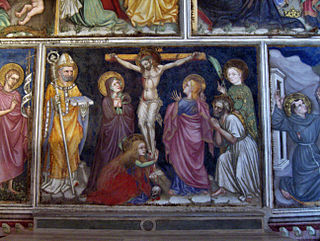
Jacopo De Fazio, best known as the blessed Jacobus de Varagine, or in Latin Voragine was an Italian chronicler and archbishop of Genoa. He was the author, or more accurately the compiler, of Legenda Aurea, the Golden Legend, a collection of the legendary lives of the greater saints of the medieval church that was one of the most popular religious works of the Middle Ages.

Robert Kilwardby was an Archbishop of Canterbury in England and a cardinal. Kilwardby was the first member of a mendicant order to attain a high ecclesiastical office in the English Church.

Heinrich Kramer, also known under the Latinized name Henricus Institor, was a German churchman and inquisitor. With his widely distributed book Malleus Maleficarum (1487), which describes witchcraft and endorses detailed processes for the extermination of witches, he was instrumental in establishing the period of witch trials in the early modern period.

Bernard Gui, also known as Bernardo Gui or Bernardus Guidonis, was a Dominican friar, Bishop of Lodève, and a papal inquisitor during the later stages of the Medieval Inquisition.

Saint Dominic, also known as Dominic of Osma and Dominic of Caleruega, often called Dominic de Guzmán and Domingo Félix de Guzmán, was a Castilian Catholic priest and founder of the Dominican Order. Dominic is the patron saint of astronomers.

Johannes Tauler OP was a German mystic, a Roman Catholic priest and a theologian. A disciple of Meister Eckhart, he belonged to the Dominican order. Tauler was known as one of the most important Rhineland mystics. He promoted a certain neo-platonist dimension in the Dominican spirituality of his time.
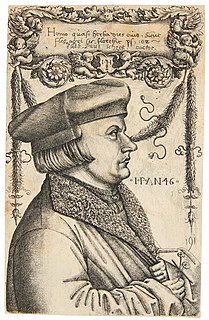
Johannes (Josef) Pfefferkorn (1469–1523) was a German Catholic theologian and writer who converted from Judaism. Pfefferkorn actively preached against the Jews and attempted to destroy copies of the Talmud, and engaged in a long running pamphleteering battle with humanist Johann Reuchlin.
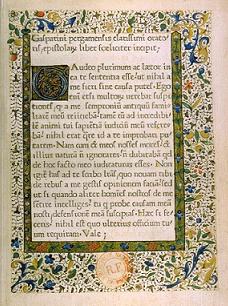
Johann Heynlin, variously spelled Heynlein, Henelyn, Henlin, Hélin, Hemlin, Hegelin, Steinlin; and translated as Jean à Lapide, Jean La Pierre , Johannes Lapideus, Johannes Lapidanus, Johannes de Lapide was a German-born scholar, humanist and theologian, who introduced the first printing press in France (Paris) in 1470.
The Formicarius, written 1436-1438 by Johannes Nider during the Council of Basel and first printed in 1475, is the second book ever printed to discuss witchcraft. Nider dealt specifically with witchcraft in the fifth section of the book. Unlike his successors, he did not emphasize the idea of the Witches' Sabbath and was skeptical of the claim that witches could fly by night. With over 25 manuscript copies from fifteenth and early sixteenth century editions from the 1470s to 1692, the Formicarius is an important work for the study of the origins of the witch trials in Early Modern Europe, as it sheds light on their earliest phase during the first half of the 15th century.
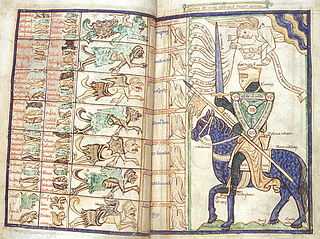
William Perault,, also spelled Perauld; Latinized Peraldus or Peraltus, was a Dominican writer and preacher.
Matija Divković was a Bosnian Franciscan and writer from Bosnia. He is considered to be the founder of modern literature in Bosnia and Herzegovina.
John of Paris, also called Jean Quidort and Johannes de Soardis, was a French philosopher, theologian, and Dominican friar.

Johannes Nider was a German theologian.
The Brethren of the Free Spirit were adherents of a loose set of beliefs deemed heretical by the Catholic Church but held by some Christians, especially in the Low Countries, Germany, France, Bohemia and northern Italy between the thirteenth and fifteenth centuries. The movement was first identified in the late thirteenth century. It was not a single movement or school of thought, and it caused great unease among Church leaders at the time. Adherents were also called Free Spirits.
Thomas of Ireland, known as Thomas Hibernicus, not to be confused with the Franciscan friar Thomas de Hibernia, who was an Irish writer. Thomas Hibernicus's claim to fame is not as an original author, but as an anthologist and indexer.
Hendrik Herp, known in Latin as Henricus Harphius, was a Dutch or Flemish Franciscan of the Strict Observance, and a writer on mysticism.
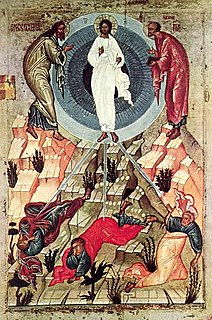
Eckhart von Hochheim, commonly known as Meister Eckhart or Eckehart, was a German theologian, philosopher and mystic, born near Gotha in the Landgraviate of Thuringia in the Holy Roman Empire.
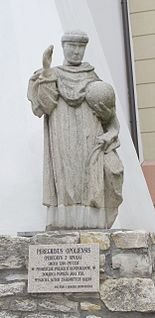
Peregrine of Opole was a Silesian Dominican friar. He was twice elected a provincial of his Order and became designated an inquisitor of Wrocław by the pope John XXII.
William of Luxi, O.P., also Guillelmus de Luxi or, was born in the region of Burgundy, France, sometime during the first quarter of the thirteenth century. He was a Dominican friar who became regent master of Theology at the University of Paris and a noted biblical exegete and preacher.
References
- 1 2 Ian D. Siggins (2009). A Harvest of Medieval Preaching: The Sermon Books of Johann Herolt, Op (Discipulus). Xlibris Corporation. pp. 1–13. ISBN 978-1-4628-2607-0 . Retrieved 10 May 2013.[ self-published source ]
- ↑ Richard Newhauser (1989). "From Treatise to Sermon: Johannes Herolt on the novem peccata aliena". In Amos, Thomas Leslie; Green, Eugene A. (eds.). De Ore Domini: Preacher and Word in the Middle Ages. Medieval Institute Publ. pp. 185–. ISBN 978-0-918720-28-3 . Retrieved 10 May 2013.
- 1 2 Ian D. K. Siggins (2012). The Rose Garden: Sermons on the Monastic Virtues by Johann Herolt Op (~1390-1468). Trafford Publishing. p. vii. ISBN 978-1-4669-6323-8 . Retrieved 10 May 2013.
- ↑ Thayer, Anne (2008), "Learning to Worship in the Later Middle Ages: Enacting Symbolism, Fighting the Devil, and Receiving Grace", Archive for Reformation History, 99: 39